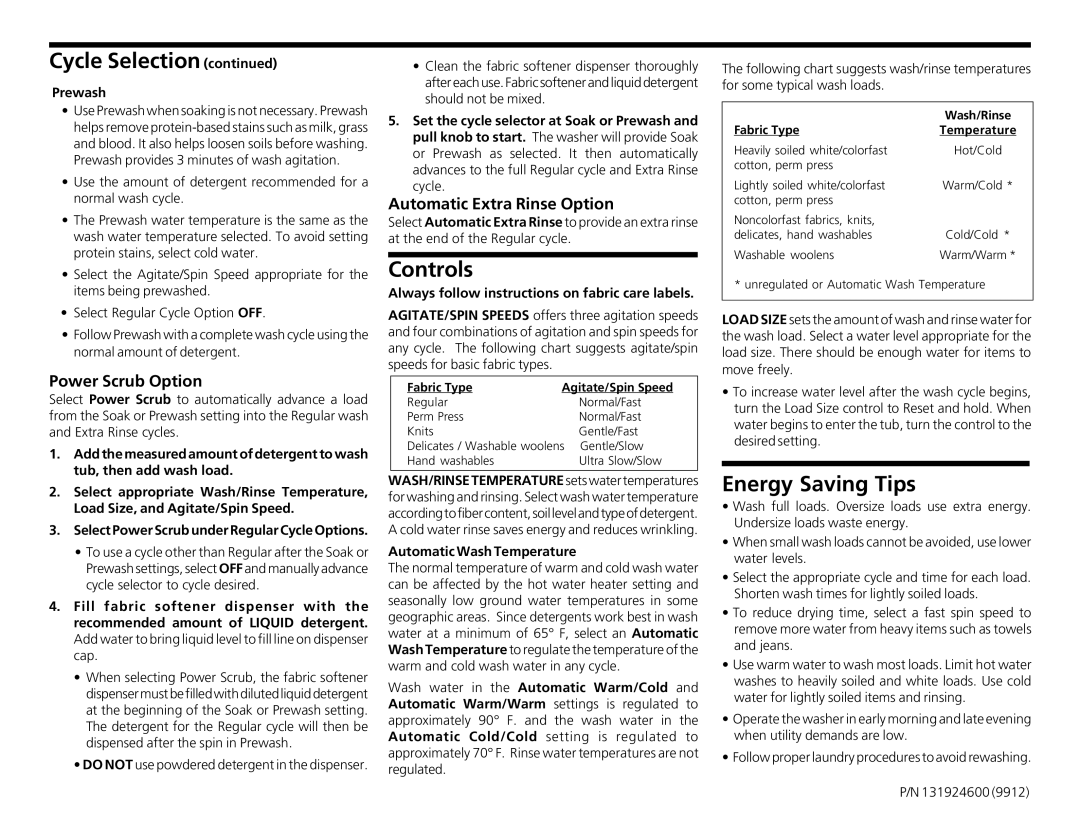
Cycle Selection (continued)
Prewash
•Use Prewash when soaking is not necessary. Prewash helps remove
•Use the amount of detergent recommended for a normal wash cycle.
•The Prewash water temperature is the same as the wash water temperature selected. To avoid setting protein stains, select cold water.
•Select the Agitate/Spin Speed appropriate for the items being prewashed.
•Select Regular Cycle Option OFF.
•Follow Prewash with a complete wash cycle using the normal amount of detergent.
Power Scrub Option
Select Power Scrub to automatically advance a load from the Soak or Prewash setting into the Regular wash and Extra Rinse cycles.
1.Add the measured amount of detergent to wash tub, then add wash load.
2.Select appropriate Wash/Rinse Temperature, Load Size, and Agitate/Spin Speed.
3.Select Power Scrub under Regular Cycle Options.
•To use a cycle other than Regular after the Soak or Prewash settings, select OFF and manually advance cycle selector to cycle desired.
4.Fill fabric softener dispenser with the recommended amount of LIQUID detergent. Add water to bring liquid level to fill line on dispenser cap.
•When selecting Power Scrub, the fabric softener dispenser must be filled with diluted liquid detergent at the beginning of the Soak or Prewash setting. The detergent for the Regular cycle will then be dispensed after the spin in Prewash.
•DO NOT use powdered detergent in the dispenser.
•Clean the fabric softener dispenser thoroughly after each use. Fabric softener and liquid detergent should not be mixed.
5.Set the cycle selector at Soak or Prewash and pull knob to start. The washer will provide Soak or Prewash as selected. It then automatically advances to the full Regular cycle and Extra Rinse cycle.
Automatic Extra Rinse Option
Select Automatic Extra Rinse to provide an extra rinse at the end of the Regular cycle.
Controls
Always follow instructions on fabric care labels.
AGITATE/SPIN SPEEDS offers three agitation speeds and four combinations of agitation and spin speeds for any cycle. The following chart suggests agitate/spin speeds for basic fabric types.
Fabric Type | Agitate/Spin Speed |
Regular | Normal/Fast |
Perm Press | Normal/Fast |
Knits | Gentle/Fast |
Delicates / Washable woolens Gentle/Slow | |
Hand washables | Ultra Slow/Slow |
WASH/RINSE TEMPERATURE sets water temperatures for washing and rinsing. Select wash water temperature according to fiber content, soil level and type of detergent. A cold water rinse saves energy and reduces wrinkling.
Automatic Wash Temperature
The normal temperature of warm and cold wash water can be affected by the hot water heater setting and seasonally low ground water temperatures in some geographic areas. Since detergents work best in wash water at a minimum of 65° F, select an Automatic Wash Temperature to regulate the temperature of the warm and cold wash water in any cycle.
Wash water in the Automatic Warm/Cold and Automatic Warm/Warm settings is regulated to approximately 90° F. and the wash water in the Automatic Cold/Cold setting is regulated to approximately 70° F. Rinse water temperatures are not regulated.
The following chart suggests wash/rinse temperatures for some typical wash loads.
| Wash/Rinse |
Fabric Type | Temperature |
Heavily soiled white/colorfast | Hot/Cold |
cotton, perm press |
|
Lightly soiled white/colorfast | Warm/Cold * |
cotton, perm press |
|
Noncolorfast fabrics, knits, |
|
delicates, hand washables | Cold/Cold * |
Washable woolens | Warm/Warm * |
* unregulated or Automatic Wash Temperature
LOAD SIZE sets the amount of wash and rinse water for the wash load. Select a water level appropriate for the load size. There should be enough water for items to move freely.
•To increase water level after the wash cycle begins, turn the Load Size control to Reset and hold. When water begins to enter the tub, turn the control to the desired setting.
Energy Saving Tips
•Wash full loads. Oversize loads use extra energy. Undersize loads waste energy.
•When small wash loads cannot be avoided, use lower water levels.
•Select the appropriate cycle and time for each load. Shorten wash times for lightly soiled loads.
•To reduce drying time, select a fast spin speed to remove more water from heavy items such as towels and jeans.
•Use warm water to wash most loads. Limit hot water washes to heavily soiled and white loads. Use cold water for lightly soiled items and rinsing.
•Operate the washer in early morning and late evening when utility demands are low.
•Follow proper laundry procedures to avoid rewashing.
P/N 131924600 (9912)
